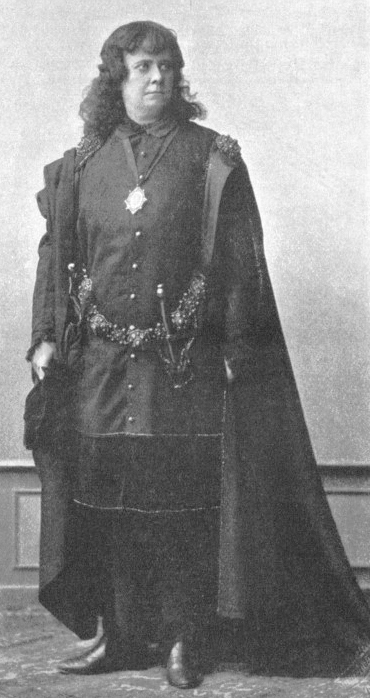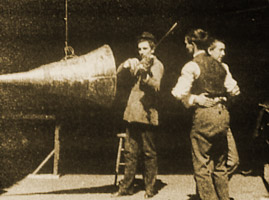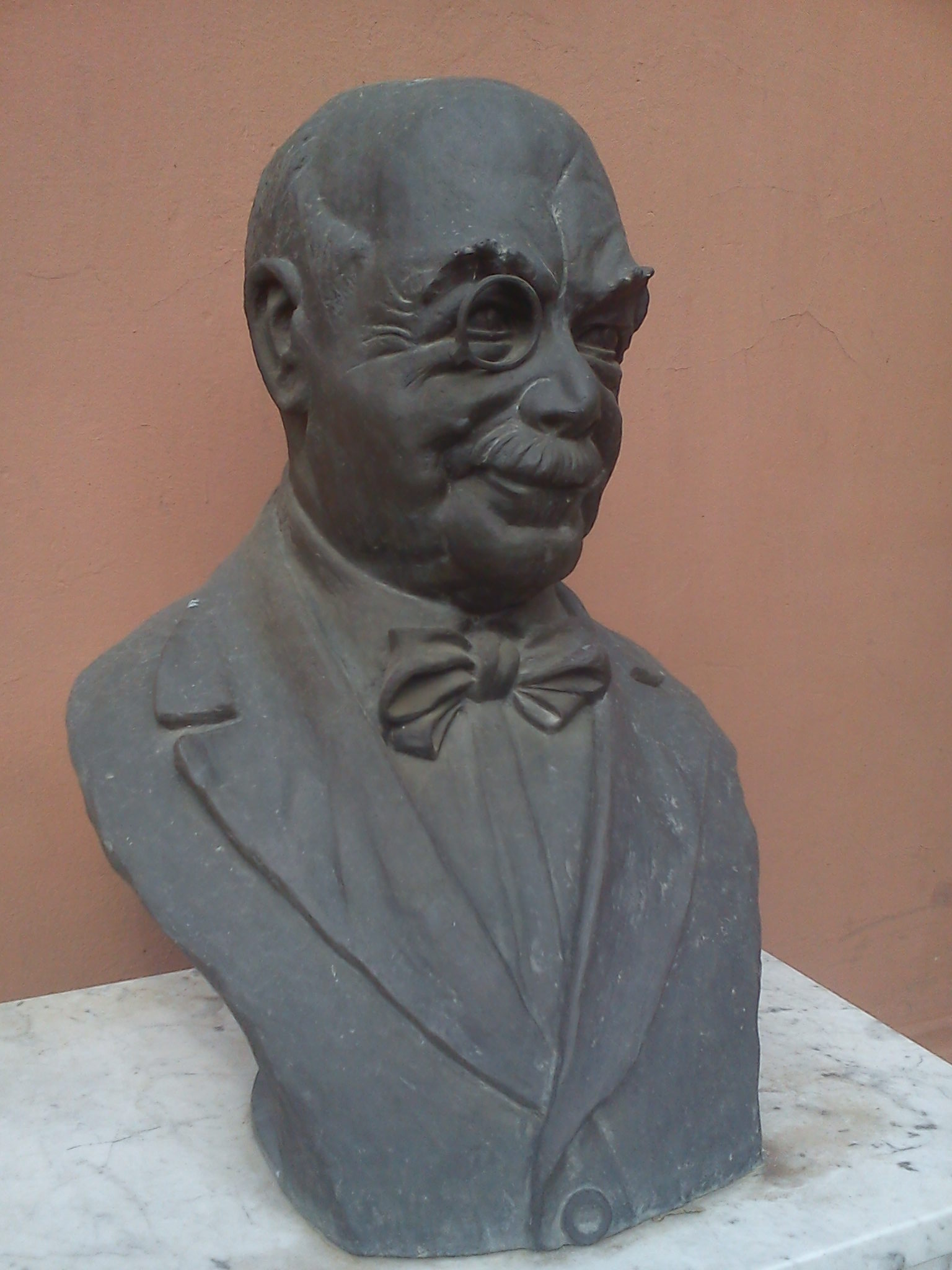|
Adele Sandrock
Adele Sandrock (; 19 August 1863 – 30 August 1937) was a German actress. After a successful theatrical career, she became one of the first German movie stars. Early life Sandrock was born in Rotterdam, Netherlands, the daughter of the German merchant Eduard Sandrock (1834–1897) and his Dutch wife, Johanna Simonetta ten Hagen (1833–1917). With sister Wilhelmine (1861-1948) and brother Christian (1862–1924), she grew up in Rotterdam, and, after her parents' divorce on 15 November 1869, in Berlin, where she learned German. Career In 1878 at the age of fifteen, Sandrock made her debut as Selma in ''Mutter und Sohn'' by Charlotte Birch-Pfeiffer. In Berlin she met the famous Meiningen Ensemble and achieved success at the Meiningen Court Theatre where her first role was Luise in Friedrich Schiller's ''Intrigue and Love'', followed by further engagements in Moscow, Wiener Neustadt, and Budapest. In 1889, she had her breakthrough at the Theater an der Wien in Vienna in the ... [...More Info...] [...Related Items...] OR: [Wikipedia] [Google] [Baidu] |
Rotterdam
Rotterdam ( , ; ; ) is the second-largest List of cities in the Netherlands by province, city in the Netherlands after the national capital of Amsterdam. It is in the Provinces of the Netherlands, province of South Holland, part of the North Sea mouth of the Rhine–Meuse–Scheldt delta, via the Nieuwe Maas, New Meuse inland shipping channel, dug to connect to the Meuse at first and now to the Rhine. Rotterdam's history goes back to 1270, when a dam was constructed in the Rotte (river), Rotte. In 1340, Rotterdam was granted city rights by William II, Count of Hainaut, William IV, Count of Holland. The Rotterdam–The Hague metropolitan area, with a population of approximately 2.7 million, is the List of urban areas in the European Union, 10th-largest in the European Union and the most populous in the country. A major logistic and economic centre, Rotterdam is Port of Rotterdam, Europe's largest seaport. In 2022, Rotterdam had a population of 655,468 and is home to over 1 ... [...More Info...] [...Related Items...] OR: [Wikipedia] [Google] [Baidu] |
Armand D'Artois
Armand d'Artois (3 October 1788 – 28 March 1867) was a 19th-century French playwright and librettist A libretto (From the Italian word , ) is the text used in, or intended for, an extended musical work such as an opera, operetta, masque, oratorio, cantata or musical. The term ''libretto'' is also sometimes used to refer to the text of major .... He is fellow librettist Achille d'Artois's brother. Biography Trained for the bar, he first worked as an attorney. The success of his play ''Les Finacés'' in 1808 caused him to devote himself entirely to literature. In 1814, he joined the guards of the king of Belgium. He left military service after receiving the Legion of Honour in 1818. A very prolific author, he wrote under various collective pseudonyms such as Emmanuel, Emmanuel Arago, M. Sapajou, with Francis baron d'Allarde and Gabriel de Lurieu. As managing director of the Théâtre des Variétés from 1830 to 1836, he also directed ''Le Nain couleur de rose'', a poli ... [...More Info...] [...Related Items...] OR: [Wikipedia] [Google] [Baidu] |
Sound Film
A sound film is a Film, motion picture with synchronization, synchronized sound, or sound technologically coupled to image, as opposed to a silent film. The first known public exhibition of projected sound films took place in Paris in 1900, but decades passed before sound motion pictures became commercially practical. Reliable synchronization was difficult to achieve with the early sound-on-disc systems, and amplification and recording quality were also inadequate. Innovations in sound-on-film led to the first commercial screening of Short film, short motion pictures using the technology, which took place in 1923. Before sound-on-film technology became viable, soundtracks for films were commonly played live with organs or pianos. The primary steps in the commercialization of sound cinema were taken in the mid-to-late 1920s. At first, the sound films which included synchronized dialogue, known as "talking pictures", or "talkies", were exclusively shorts. The earliest feature fil ... [...More Info...] [...Related Items...] OR: [Wikipedia] [Google] [Baidu] |
Hans Hinrich
Hans Hinrich (27 November 1903 – 20 October 1974) was a German film director and actor. He initially worked in Germany but later also worked in Italy where he was usually credited as ''Giovanni Hinrich''. Hinrich was a noted theatre director, before moving into film directing in 1932. Hinrich was of Jewish heritage but he converted to Roman Catholicism, Catholicism. While he was initially granted permission to continue working following the Nazi takeover of Germany, he found it increasingly difficult and moved to Italy following the production of ''Freight from Baltimore'' (1938). During the Fascist era he made several films such as the historical ''Lucrezia Borgia (1940 film), Lucrezia Borgia'' (1940). When Hinrich was threatened with dismissal from the 1941 film ''Il vetturale del San Gottardo'', several of his actors including Osvaldo Valenti secured a reversal of the decision by protesting their support for him.Lehman & Grieb p.181 After the war Hinrich moved from directi ... [...More Info...] [...Related Items...] OR: [Wikipedia] [Google] [Baidu] |
Reinhold Schünzel
Reinhold Schünzel (7 November 1888 – 11 November 1954) was a German actor and director, active in both Germany and the United States. The son of a German father and a Jewish mother, he was born in St. Pauli, the poorest part of Hamburg. Despite his ancestry, Schünzel was allowed by the Nazis to continue making films for several years until he left in 1937 to live abroad. Biography Life in Germany Reinhold Schünzel (or Schuenzel) started his career as an actor in 1915 with a role in the film '' Werner Krafft''. He directed his first film in 1918's ''Mary Magdalene'' and in 1920 directed '' The Girl from Acker Street'' and ''Catherine the Great''. He was one of Germany's best-known silent film stars after World War I, a period during which films were significantly influenced by the consequences of the war. Schünzel performed in both comedies and dramas, often appearing as a villain or a powerful and corrupt man. He was influenced by filmmakers such as his mentor Richard Oswa ... [...More Info...] [...Related Items...] OR: [Wikipedia] [Google] [Baidu] |
Silent Film
A silent film is a film without synchronized recorded sound (or more generally, no audible dialogue). Though silent films convey narrative and emotion visually, various plot elements (such as a setting or era) or key lines of dialogue may, when necessary, be conveyed by the use of inter- title cards. The term "silent film" is something of a misnomer, as these films were almost always accompanied by live sounds. During the silent era, which existed from the mid-1890s to the late 1920s, a pianist, theater organist—or even, in larger cities, an orchestra—would play music to accompany the films. Pianists and organists would play either from sheet music, or improvisation. Sometimes a person would even narrate the inter-title cards for the audience. Though at the time the technology to synchronize sound with the film did not exist, music was seen as an essential part of the viewing experience. "Silent film" is typically used as a historical term to describe an era of cinema p ... [...More Info...] [...Related Items...] OR: [Wikipedia] [Google] [Baidu] |
Max Reinhardt
Max Reinhardt (; born Maximilian Goldmann; 9 September 1873 – 30 October 1943) was an Austrian-born Theatre director, theatre and film director, theater manager, intendant, and theatrical producer. With his radically innovative and avant-garde stage productions, Reinhardt is regarded as one of the most prominent stage directors of the early 20th century. For example, Reinhardt's 1917 stage premiere of Reinhard Sorge's Kleist Prize-winning stage play ''Der Bettler'' almost single-handedly gave birth to Expressionism in Expressionism (theatre), the theatre and ultimately German expressionist cinema, in motion pictures as well. In 1920, Reinhardt established the Salzburg Festival by directing an open air production of Hugo von Hofmannsthal's Jedermann (play), acclaimed adaptation of the ''Elckerlijc, Everyman'' Medieval mystery play in the square before the Cathedral with the Alps as a background. This remains an annual custom at the Salzburg Festival to this day. Toby Cole and ... [...More Info...] [...Related Items...] OR: [Wikipedia] [Google] [Baidu] |
Deutsches Theater (Berlin)
The Deutsches Theater is a theater in Berlin, Germany. It was built in 1850 as Friedrich-Wilhelm-Städtisches Theater, after Frederick William IV of Prussia. Located on Schumann Street (Schumannstraße), the Deutsches Theater consists of two adjoining stages that share a common, classical facade. The main stage was built in 1850, originally for operettas. Adolf L'Arronge founded the Deutsches Theater in 1883 with the ambition of providing Berliners with a high-quality ensemble-based repertory company on the model of the German court theater, the Meiningen Ensemble, which had been developed by Georg II, Duke of Saxe-Meiningen and his colleagues to become "the most widely admired and imitated company in Europe", thanks to its historically accurate sets and costumes, vividly-realized crowd scenes, and meticulous directorial control.Banham (1998a) and (1998b). Otto Brahm, the leading exponent of theatrical Naturalism in Germany, took over the direction of the theater in 1894, a ... [...More Info...] [...Related Items...] OR: [Wikipedia] [Google] [Baidu] |
Alexander Roda Roda
Alexander Friedrich Ladislaus Roda Roda (13 April 1872 – 20 August 1945) was an Austrian writer and satirist. Biography Roda Roda was born as Šandor Friedrich Rosenfeld in Drnowitz, Moravia, Austria-Hungary (now Drnovice, Czech Republic). His sister was the physician Gisela Januszewska. As a child, he moved with his family to Slavonia. He Germanized his name from Šandor to Alexander, and his surname from Rosenfeld to Roda Roda. Roda is the Croatian word for stork. He chose his new surname because storks nested on the chimney of his house in Esseg (today Osijek). In 1894, Roda Roda converted from Judaism to Catholicism.Kaiser, Max: "Roda Roda (bis 1899 Rosenfeld, 1899–1906 Roda), Alexande ... [...More Info...] [...Related Items...] OR: [Wikipedia] [Google] [Baidu] |
La Ronde (play)
''La Ronde'' (also known by its original German title, ''Reigen'') is a play in which ten people form an unwitting interpersonal circle with their secret sexual relationships. It was written by Arthur Schnitzler in 1897 and was controversial at that time. It scrutinizes the sexual morality and class ideology of its day through successive encounters between pairs of characters (before or after a sexual encounter). By choosing characters across all levels of society, the play offers social commentary on how sexual contact transgresses class boundaries. Printed privately in 1900, it was not publicly performed until 1920, when it provoked strong reactions. The play's two titlesin German ''Reigen'' and in French ''La Ronde''refer to a round dance, as portrayed in the English rhyme Ring a Ring o' Roses. Publication and reception ''La Ronde'' was first printed in 1900 for private circulation amongst friends. In 1903, the first German-language edition was published in Vienna, selling ... [...More Info...] [...Related Items...] OR: [Wikipedia] [Google] [Baidu] |
Arthur Schnitzler
Arthur Schnitzler (15 May 1862 – 21 October 1931) was an Austrian author and dramatist. He is considered one of the most significant representatives of Viennese Modernism. Schnitzler’s works, which include psychological dramas and narratives, dissected turn-of-the-century Viennese bourgeois life, making him a sharp and stylistically conscious chronicler of Viennese society around 1900. Schnitzler's Jewish upbringing and the sexual content of his works made them controversial or banned in his time and beyond. Life Arthur Schnitzler was born at Praterstrasse 16, Leopoldstadt, Vienna, capital of the Austrian Empire (as of 1867, part of the dual monarchy of Austria-Hungary). He was the son of a prominent Hungarian laryngologist, Johann Schnitzler (1835–1893), and Luise Markbreiter (1838–1911), a daughter of the Viennese doctor Philipp Markbreiter. His parents were both from Jewish families. In 1879 Schnitzler began studying medicine at the University of Vienna and in 18 ... [...More Info...] [...Related Items...] OR: [Wikipedia] [Google] [Baidu] |
Henrik Ibsen
Henrik Johan Ibsen (; ; 20 March 1828 – 23 May 1906) was a Norwegian playwright, poet and actor. Ibsen is considered the world's pre-eminent dramatist of the 19th century and is often referred to as "the father of modern drama." He pioneered theatrical realism, but also wrote lyrical epic works. His major works include ''Brand'', ''Peer Gynt'', '' Emperor and Galilean'', '' A Doll's House'', '' Ghosts'', '' An Enemy of the People'', '' The Wild Duck'', '' Rosmersholm'', '' Hedda Gabler'', '' The Master Builder'', and '' When We Dead Awaken''. Ibsen is the most frequently performed dramatist in the world after Shakespeare, and ''A Doll's House'' was the world's most performed play in 2006. Ibsen was born into the merchant elite of the port town of Skien, and had strong family ties to the families who had held power and wealth in Telemark since the mid-1500s. Both his parents belonged socially or biologically to the Paus family of Rising and Altenburggården—the extende ... [...More Info...] [...Related Items...] OR: [Wikipedia] [Google] [Baidu] |






